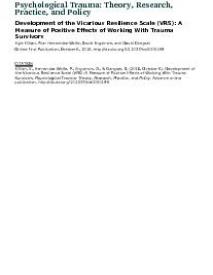Development of the Vicarious Resilience Scale (VRS) : A Measure of Positive Effects of Working With Trauma Survivors
Objective: Attending to the potential impacts, both positive and negative, of clinical work with trauma survivors on professionals themselves is a crucial aspect of clinical training and supervision. Vicarious resilience refers to unique, positive effects that transform therapists in response to witnessing trauma survivors’ resilience and recovery process. This study describes the development and exploratory factor analysis of the first instrument to assess vicarious resilience. Method: The Vicarious Resilience Scale (VRS) was developed and administered via electronic survey to 190 helping professionals from around the globe working with survivors of severe traumas, such as torture. Results: Exploratory factor analysis yielded 7 factors: Changes in life goals and perspective, client-inspired hope, increased recognition of clients’ spirituality as a therapeutic resource, increased capacity for resourcefulness, increased self-awareness and self-care practices, increased consciousness about power and privilege relative to clients’ social location, and increased capacity for remaining present while listening to trauma narratives. The Cronbach’s alpha reliability of the VRS was .92 and, as hypothesized, the VRS was moderately and positively correlated with posttraumatic growth and compassion satisfaction, indicating convergent validity. The VRS was not significantly correlated with compassion fatigue (CF) or burnout, indicating discriminant validity and that vicarious resilience is a unique construct that is not merely “the opposite” of CF or burnout. Conclusion: The VRS possesses sound psychometric properties and can be utilized in supervision and training contexts and for self-assessment by professionals working with trauma survivors to aid the recognition and cultivation of vicarious resilience.
Geachte bezoeker,
De informatie die u nu opvraagt, kan door psychotraumanet niet aan u worden getoond. Dit kan verschillende redenen hebben,
waarvan (bescherming van het) auteursrecht de meeste voorkomende is. Wanneer het mogelijk is om u door te verwijzen naar de bron
van deze informatie, dan ziet u hier onder een link naar die plek.
Als er geen link staat, kunt u contact opnemen met de bibliotheek,
die u verder op weg kan helpen.
Met vriendelijke groet,
Het psychotraumanet-team.
In: Psychological Trauma: Theory, Research, Practice, and Policy ; ISSN: 1942-9681 | 9 | 1 | 23-31


